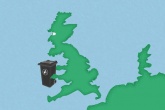The legality of resisting residual restrictions
The Insider questions the legality of private services stepping in where councils are restricting residual waste.
Changes in policy can have unexpected results. Take the shift to less frequent residual waste collections, for example. Despite the encouragement the last government gave to maintaining weekly collections, around three quarters of councils now collect residual waste fortnightly from kerbside properties.
The result for many has been a boost in recycling. Now councils are increasingly looking at three-weekly collections, with the early evidence suggesting that this brings a further rise in recycling rates. In 2015/16, Bury was the first English authority to report a full year of the three-weekly collections model, and while recycling rates plateaued nationally, its household recycling rate bucked the trend, rising to 49 per cent from 39 per cent in 2014/15.

However, some people are responding in unexpected ways to the policy of reducing the amount of residual waste disposal capacity. An increasing number of people seem to be opting to pay for a private waste collector to empty their residual waste bin on the weeks when the council doesn’t. Most of the operators seem to charge at least as much as a business might be charged for a bin of a similar size, so it isn’t a cheap option.
Talking to a member of staff from a company offering this service, I was told that their customers are mostly people who just don’t want to recycle, and are willing to pay so that they don’t have to. Some such companies claim to recycle much – or even ‘all’ – of the waste they collect, but most will just take the waste to a transfer station for some rudimentary sorting before it is sent for incineration.
Is this something councils should be worried about? In a way, it could be seen as just taking waste off their hands, and thereby reducing their costs – but there are some reasons to be concerned.
Under S45 of the Environmental Protection Act 1990, the only exceptions to councils’ general duty to collect household waste are where a house is ‘so isolated or inaccessible that the cost of collecting it would be unreasonably high’, or where the authority is satisfied that the householder has made adequate arrangements for the disposal of the waste.
It is questionable whether the service provided by a company that just collects residual waste is ‘adequate’, or even lawful. How does such a service comply with the waste hierarchy, as all waste collectors must? The very existence of the service seems to allow householders to take waste they would otherwise have had to recycle and instead send it for disposal or energy recovery. So, are councils actually under a duty not to allow these collections?
 This article was taken from Issue 89
This article was taken from Issue 89Another consideration is the impact on recycling. People who pay for residual collections will still be getting perhaps half their waste collected by the council. They are unlikely to be recycling much, depressing their council’s reported rate. The situation could become worse in future: under the EU’s circular economy proposals, which the UK may yet end up adopting, each country would have to report statistics on all household and household-like commercial waste, whether collected by municipalities or privately. If significant amounts of household residual waste are escaping the council system, it will make the task of hitting higher recycling rates harder.








